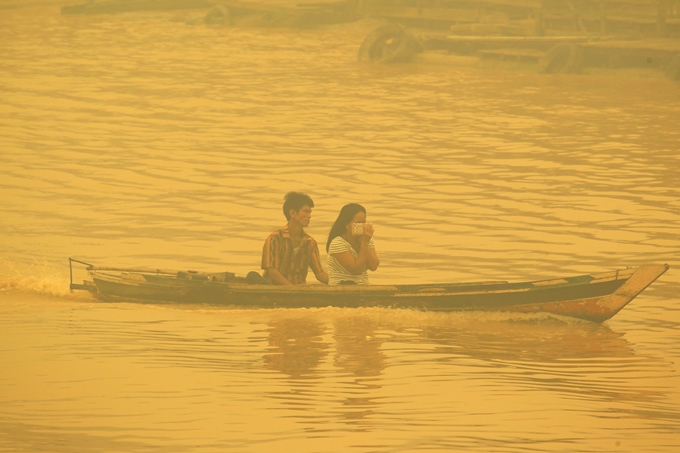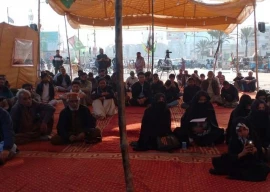
For nearly two months, thousands of fires caused by slash-and-burn farming have suffocated vast expanses of Southeast Asia, causing rates of respiratory illnesses to soar, schools to close, and scores of flights and some international events to be cancelled.
Thailand usually avoids the worst effects of Indonesia's fires, which annually blight Malaysia and Singapore.
But in recent weeks prevailing winds have brought the smog further north, stoking tensions and creating a headache for the country's vital tourism industry.
 An Indonesian woman and a child walk on a bamboo bridge as thick yellow haze shrouds the city in Palangkaraya on October 22, 2015. PHOTO: AFP
An Indonesian woman and a child walk on a bamboo bridge as thick yellow haze shrouds the city in Palangkaraya on October 22, 2015. PHOTO: AFPIndonesia accepts international help to combat fires
Thai officials Thursday said air quality had dipped to unhealthy levels in seven southern provinces, with particularly high readings in southwestern Songkhla province where some flights have been delayed or turned back.
"It's considered a crisis. It's the worst in 10 years," Halem Jemarican, head of the Environment Office in Songkhla province, told AFP by phone.
"The key factor is the wind. It's strong at the hot spot origins but when it reaches Thailand the winds weaken so the haze stays around for longer," he added.
Transport officials said two Bangkok to Koh Samui flights had to return to base Thursday while a Singapore flight to the resort island diverted to Phuket. A flight to Songkhla's Hat Yai airport was also diverted on Wednesday evening.
Southern Thailand boasts many pristine tropical beaches and is an especially popular tourism destination.
Earlier this month several planes packed with beach-bound tourists to Phuket and Koh Samui were forced to turn back because of haze levels.
Thailand's Public Health Ministry said it had distributed 55,700 facemasks in the south with a further 40,000 were on the way.
In a statement the country's Pollution Control Department said it had "called for Indonesia to implement measures to reduce burning in order to mitigate haze".
 Indonesian men put out a fire in Ogan Ilir, southern Sumatra on October 22, 2015. PHOTO: AFP
Indonesian men put out a fire in Ogan Ilir, southern Sumatra on October 22, 2015. PHOTO: AFPSingapore World Cup meet threatened by haze
Land is illegally cleared by burning in Indonesian tropical peatlands, which are rich in carbon but are being drained and cleared at a rapid rate to make way for agriculture, particularly fast-expanding palm oil plantations.
While the loudest complaints have come from leaders in relatively affluent Singapore and Kuala Lumpur, it is poor Indonesian villagers who are suffering most.
Pictures this week revealed a thick, yellow haze smothering Palangkaraya in central Indonesia, with locals forced to go about their daily life regardless of the extreme health hazards.
Experts warn the current outbreak of pollution is on track to become the worst ever, exacerbated by bone-dry conditions caused by the El Nino weather phenomenon.
Indonesia earlier this month agreed to accept international help after failing for weeks to douse the fires and last week launched its biggest fire-fighting push yet, with dozens of planes backing up thousands of personnel on the ground.
1735368609-0/Untitled-(4)1735368609-0-405x300.webp)
1735365305-0/Untitled-(3)1735365305-0-165x106.webp)
1735363887-0/Untitled-(2)1735363887-0-165x106.webp)
1735362150-0/Untitled-(1)1735362150-0-165x106.webp)


1735367550-0/Untitled-design-(70)1735367550-0-270x192.webp)





1735283394-0/sidra--(9)1735283394-0-270x192.webp)
1735299255-0/sidra--(18)1735299255-0-270x192.webp)
1720030784-0/Smog-free-Lahore-(14)1720030784-0-270x192.webp)








COMMENTS
Comments are moderated and generally will be posted if they are on-topic and not abusive.
For more information, please see our Comments FAQ